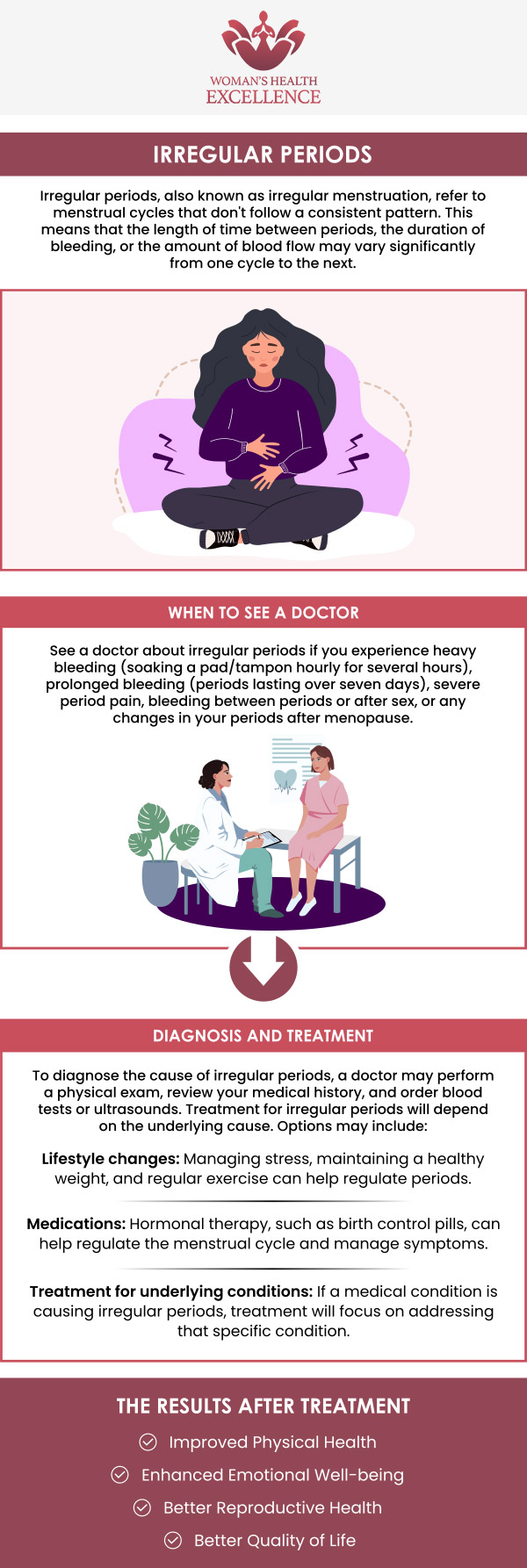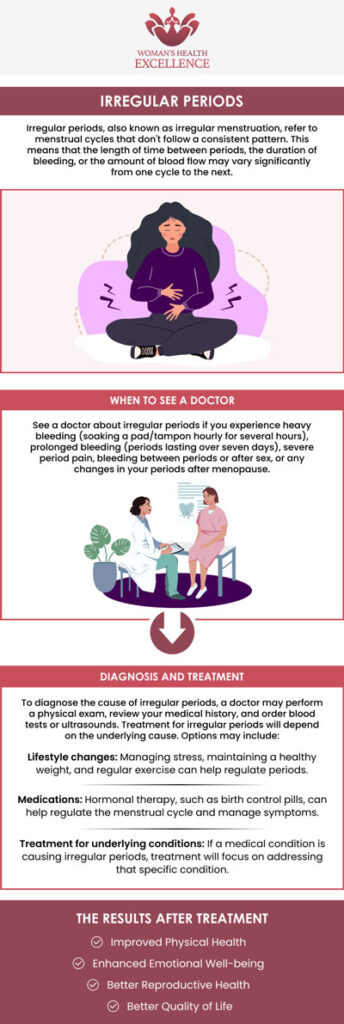Irregular Periods: When to See a Doctor
A period is considered irregular when it suddenly deviates from the normal range of the menstrual cycle time frame. Numerous factors contribute to irregular periods, the most frequent cause is hormonal changes like menopause or hormonal contraception. If you’re concerned about the irregularity of your menstrual cycle, visit us at The OB-Gyn & Incontinence Center. Dr. Prema Kothandaraman, MD, and her experienced team can assist you understand why your period is so unpredictable and offer treatments to manage them effectively. For more information contact us or book an appointment online. We have convenient locations to serve you in Arcadia CA and Glendale CA.




Table of Contents:
What do Gynecologists do for irregular periods?
How can I fix my irregular periods?
When should irregular periods be a concern?
What is the root cause of irregular periods?
A healthy, normal menstrual cycle will last anywhere from 4-10 days, with roughly 24-38 days between each cycle. When your period is late, or doesn’t come regularly, it can be incredibly stressful – especially if you don’t know what’s causing it.
It’s important to recognize that many factors can play into how regular or irregular your period is. This includes changes in your hormone levels, your medical health, stress levels, medications, and much more.
To diagnose irregular periods and discover what is causing them, your gynecologist will ask you about your menstrual regularity and medical history. In addition to this, they’ll also perform a thorough physical examination, including a pelvic exam, to check for any observable irregularities or sensitivities.
If more information is required, they may also want you to go in for additional diagnostic testing. This may include a pelvic ultrasound, endometrial biopsy, and/or hysteroscopy.
Once enough information has been gathered, and the cause of your irregular period has been identified, they will talk to you about an appropriate treatment plan. This may include lifestyle changes, medical treatments, and/or medications.
There are many different ways to treat irregular cycles, but it all starts with determining what is causing the issue to start with. Depending on the underlying cause of your irregular cycles, your doctor may suggest one or more of the following treatments:
• Prescription medication.
• Losing or gaining weight (if irregularities are caused by weight-related issues).
• Hormonal therapies include but are not limited to, birth control.
• Surgical therapy.
• Stress management techniques (if irregularities are caused by stress).
• Changing the medication you’re on may be affecting your periods.
Many different physical and mental factors can affect the regularity of your cycle, which is why it’s so important to consult with your doctor. They will help you pinpoint the cause and deliver a custom treatment plan to help you safeguard your health and peace of mind.
While it’s completely normal to have slight variations in the length and heaviness of your menstrual cycle, certain symptoms may suggest a larger medical issue may be taking place.
You should contact your gynecologist or primary care provider as soon as possible if you are having extremely painful or irregular periods that are accompanied by any of the following symptoms:
• Severe cramping during or after your period.
• Unusually heavy bleeding (characterized by soaking through a pad or tampon every hour for 2-3 hours).
• Passing large clots that are bigger than a quarter.
• Foul-smelling discharge coming from the vagina.
• If your period has lasted longer than 10 days.
• Vaginal bleeding or spotting between cycles.
• Bleeding or spotting after you’ve hit menopause.
• If your periods have suddenly become irregular after having always had regular cycles.
• Nausea or vomiting during your cycle.
• Symptoms of toxic shock syndrome (fever, vomiting, diarrhea, fainting, or dizziness).
Irregular periods can be caused by many different factors that vary from person to person. As such, there is no one specific ‘root cause’, which is why it’s important to consult with your doctor to determine what the underlying problem is.
The cause of irregular periods may include:
• An ectopic pregnancy.
• Birth control.
• Bleeding disorders.
• Breastfeeding.
• Certain medications.
• Endometriosis.
• Excessive exercise routines result in low body fat percentages.
• Gaining or losing a significant amount of weight.
• Miscarriages
• Ovarian cancer.
• Pelvic inflammatory disease.
• Polycystic ovary syndrome.
• Primary ovarian insufficiency.
• Scarring or blockages in the reproductive system.
• Stress.
• Thyroid or pituitary gland disorders.
• Uterine cancer.
• Viruses or other illnesses.
Many women worry about menstrual abnormalities as they can be painful and uncomfortable. If you’re experiencing irregular periods that are causing you physical or emotional distress, visit us at The OB-Gyn & Incontinence Center. Our team of experienced, professional specialists will provide you with the exceptional care you need to get to the bottom of your menstrual irregularities. For more information contact us or book an appointment online. We have convenient locations to serve you in Arcadia CA and Glendale CA. We serve patients from Arcadia CA, Glendale CA, Monrovia CA, Pasadena CA, Los Angeles CA, Burbank CA and surrounding areas.


Additional Services You May Need
▸ Urogynecology
▸ Minimally Invasive Gynecology
▸ Monalisa & Medical Aesthetics
▸ Bioidentical Hormone Replacement Therapy
▸ Urinary Incontinence
▸ Pelvic Organ Prolapse
▸ Painful Bladder
▸ Urinary Tract Infection
▸ Genitourinary Syndrome of Menopause
▸ Female Sexual Dysfunction
▸ Urinary Retention
▸ Vaginal Laxity & Prolapse
▸ Postpartum Pelvic Floor Problems
▸ PCOD
▸ Bladder Prolapse Repair
▸ Urgent PC
▸ Fibroids
▸ Excessive Bleeding
▸ Pelvic Pain
▸ Birth Control & IUD
▸ Vaginal & Pelvic Infection
▸ Monalisa Touch
▸ STD
▸ TempsureVitalia
▸ Biote Pellet Therapy
▸ Topical BHRT
▸ Flexsure
▸ Rectal Prolapse Repair
▸ Tempsure ENVI
▸ Minimally Invasive Pelvic Surgery for Incontinence



